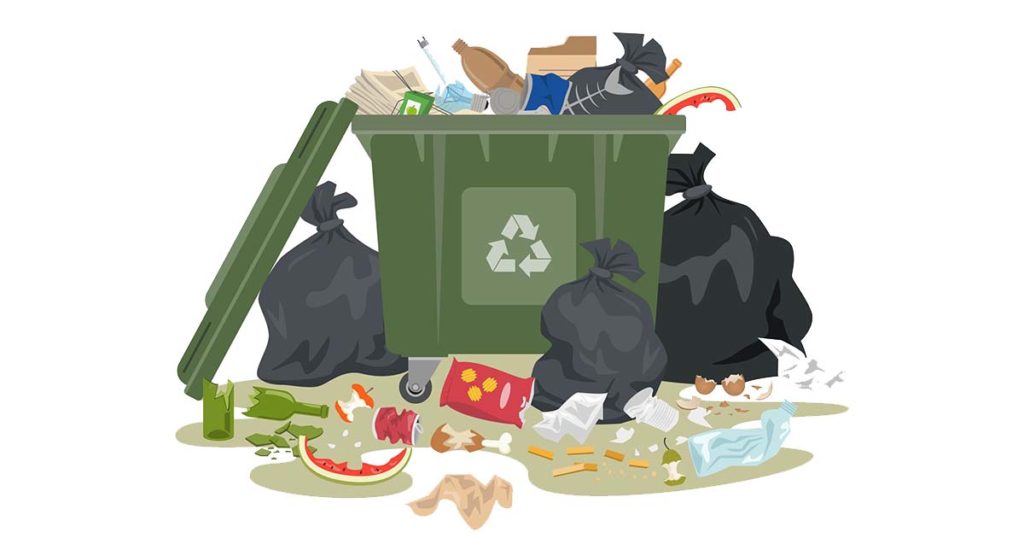Garbage collection services can be costly and slow if you’re not looking for the right company or service from them.
Whether you’re looking for a provider to pick up trash for your new business or want to reduce how much you’re currently spending for commercial waste collection.
There are many easy ways to streamline the trash removal process.
Follow these tips to get better service rates and avoid unexpected dumpster fees on your monthly invoice.
1. Ordering On Time.
For many new business owners, a dumpster is the last thing on their minds as they get ready to open.
That’s why many people wait until the last minute to set up their trash pickup service.
But if you don’t rent your dumpster in time, you might risk failing your inspection.
Most dumpster companies can’t deliver a bin and start service with such short notice. This is especially true if it’s a day before or the day of the inspection.
To prevent this from happening, it’s best to get a container delivered one week before you open your business – at the latest.
You’ll also want to give yourself a few days (or even weeks) beforehand to research haulers and find the best waste solution for your organization.
2. Know The Rules.
If you’re not following local garbage collection regulations, you risk being fined by the city.
With commercial trash removal, there are a few key regulations to look out for.
Get in touch with your local municipality to ask about:
- Recycling Requirements
- E-Waste Regulations
- Food Waste Requirements
- Permits or Licenses
Many states and cities in the U.S. have mandatory recycling requirements for commercial businesses.
For example, the state of California requires that commercial businesses that produce four cubic yards or more of garbage per week implement recycling programs.
Ask your municipality if you need to recycle certain types of waste such as cardboard, plastic or metal cans.
3. The Right Size.
The four most common commercial dumpster sizes are:
- 2 yards
- 4 yards
- 6 yards
- 8 yards
The size names indicate the volume of waste (in cubic yards) they can hold.
Generally, you’ll want to select a size based on how much waste your organization produces.
Here’s a chart breaking down the average capacity, typical dimensions and industries that are best for each dumpster size:
Keep in mind how much space you have available on-site to safely place a bin.
Your business may generate enough waste to fill an 8 yard container, but if you only have a limited amount of space, you may have to rent a smaller size.
Thankfully, if this is your first time choosing a dumpster size for a business location, you don’t have to go at it blindly.
We’ll help you choose the dumpster size that fits the amount of waste your business typically produces within your pickup timeframe.
That way, you won’t be paying for extra pickups or for more volume than you really need.
4. Where To Place It.
At this point, you’ve selected a dumpster size.
But where will your container go when it gets delivered?
In most cases, waste providers will go out to the property to make sure it’s serviceable and to determine the location before accepting the customer.
Your garbage collection provider should help you choose the best possible spot.
But you’ll need to take measurements outside of the building to find an area with enough space and no hazards like branches or hanging wires.
5. Find The Best Provider.
We suggest reaching out to at least two or three different commercial garbage collection service companies to compare prices and service features.
That’s when you can make sure you’re getting the most cost-effective trash pickup solution for your organization.
Here are a few good rules of thumb to follow during this process:
- Compare dumpster prices
- Ask about the flexibility of their service
- See if you’ll have dedicated account management
- Look for a national provider
- Read reviews
- Consider long-term contracts to save money
- Don’t sign until you read the contract
6. Set Up A Schedule.
Work with your new waste provider to identify the number of pickups you need and optimal days for these pickups per week.
This will depend on a few things including how much waste – and what type of waste – you produce in a set amount of time.
It will also depend on your business schedule when you want the company to pick up the dumpster.
7. Explore Recycling Options.
Even if you aren’t required to recycle by your state or municipality, this is a great time to arrange for recycling services.
The garbage collection company you hire should be able to service both your trash and recycling pickup.
Recycling materials such as plastic, paper, glass, etc. can offer numerous benefits including:
- Money savings: When you recycle waste, you divert materials from your trash. You’ll need fewer pickups and may be able to use a smaller bin, so you’ll reduce your waste removal costs.
- Reducing your business’s carbon footprint: Recycling keeps more trash out of landfills, which means fewer greenhouse gasses entering our atmosphere.
- Boosting your local economy: Recycling can help improve your local economy by creating new jobs. According to IBISWorld, this industry is growing, recycling facilities employ more workers now than they did in 2017, and the average recycling facility employs 15.9 employees.
8. Request A Free Audit.
Some dumpster companies offer free waste audits (also known as waste assessments).
This is where they look at your current service setup and identify ways to help you save money and recycle more materials.
They will evaluate details like:
- The bin sizes you use.
- The percentage of waste you recycle vs. send to the landfill.
- Your pickup schedule and collection frequency.
If you can get a free audit, it’s a great way to see how another provider can better serve you outside of just a quoted price or a comparison of service features.
9. Make Transitioning Providers Smooth.
When switching providers, make sure there won’t be a time you’ll be without a dumpster.
Ensure they can deliver a new bin to you shortly after your former provider picks up their container.
Also, ask when and how you’ll be billed and if you can start your new agreement with them right after your contract with your current provider ends.
10. Add Accessories.
Besides renting a dumpster, you can add features to your container for optimal service, such as:
- Casters: Wheels make it easier to move your dumpster in tight areas like alleyways.
- Lock Bars: Prevent outside trash (and raccoons) from ending up in your bin by locking it.
- Drain Plugs: Keep wet waste from leaking out of the dumpster and causing health issues.
11. Build A Dumpster Enclosure.
Whether or not your municipality requires a bin enclosure, there are several benefits to having a dumpster enclosure.
You’ll stop trash from blowing around your property, keep animals from getting inside it and have more control over who can use your dumpster.
12. Prevent Illegal Dumping.
Besides adding a lock bar to your bin and building a dumpster enclosure, there are other things you can do to stop people from illegally dumping garbage in your dumpster.
Two examples include putting up a warning sign telling people that your bin is for private use only and installing security cameras to monitor the area.
13. Understand Different Fees.
You first need to know what kinds of dumpster rental fees you may face. These are common ones many businesses find themselves having to pay:
- Disposal fees
- Trip charges
- Overage charges
- Overloading fees
14. Make Your Dumpster Accessible The First Day.
In order for your hauler to access and dispose of your waste, the area in front of your dumpster must be clear of any obstructions.
Make sure that no one parks there and keep the area plowed in the winter so you won’t have to pay trip charges.
If you keep your dumpster inside a locked enclosure, be careful not to lock your hauler out of the area on pickup day.
15. Don’t Overfill Your Dumpster.
Instruct your employees on how to properly load the bin.
Some containers may have signage on them with these kinds of instructions, but it may be helpful to put up posters outside or near the exit doors as reminders.
Some dumpster providers may provide signs free of charge.
Don’t allow items to stick up over the top or hang over the sides of your dumpster.
In addition, keep all your materials contained to ensure you don’t miss out on a pickup.
Moreover, make sure employees only use your dumpster to dispose of your typical commercial trash.
Also, if you’re planning a one-time project that will produce a lot of waste like a renovation or a special event, consider renting a temporary dumpster to handle the excess debris.
16. Don’t Toss Prohibited Items.
Landfills don’t accept certain items because they contain hazardous materials, and if these items are found in your dumpster, you’ll need to pay extra.
While disposal regulations vary, here are some prohibited items that aren’t allowed in commercial dumpsters:
17. Ask For Waste Reports.
Ask your dumpster provider to monitor your garbage collection on a monthly, quarterly or biannual basis.
This can help identify opportunities to lower your waste disposal costs.
It will also confirm if your pickup schedule and frequency match your current waste output.
18. Adjust The Size & Frequency As Needed.
While it’s easy to just set up a contract and forget about your trash, there are basic things you can do to save money.
You also may need to make adjustments based on the growth of your business.
Don’t miss out on these opportunities.
Request free waste audits or waste reports from your trash collection company to make sure the service you’re getting is best for your business.
To Conclude.
Garbage collection services can be costly and non-efficient if you don’t find what you’re looking for.
So it’s always good to do some research and compare different companies to see which ones will benefit you the most.
The cost, size, place, and so much more depend on who you’re working with and what you request from them.
Credit: https://www.dumpsters.com/blog/commercial-waste-disposal-tips



My favorite part of this article is that you should consider hiring ahead of time to prevent management problems. Yesterday, my uncle told me he was planning to hire a commercial trash removal solution to have proper trash collection for their business store, and he asked if I had any other idea what would be the best option to consider. Thanks to this helpful article, I’ll be sure to tell him that they can consult a well-known commercial trash removal service as they can provide information about the waste management process.